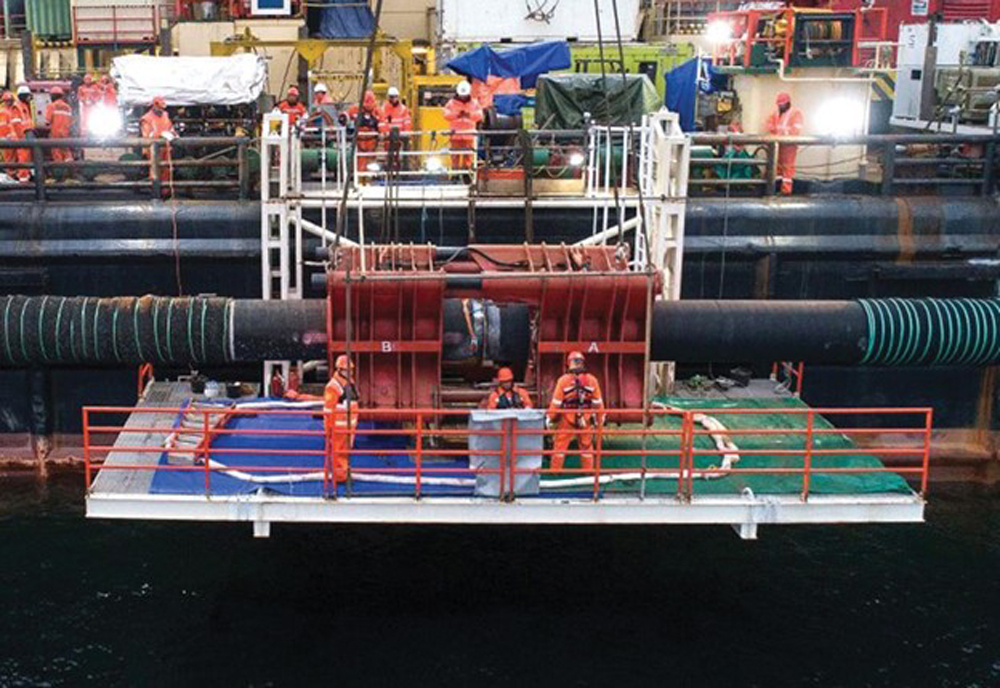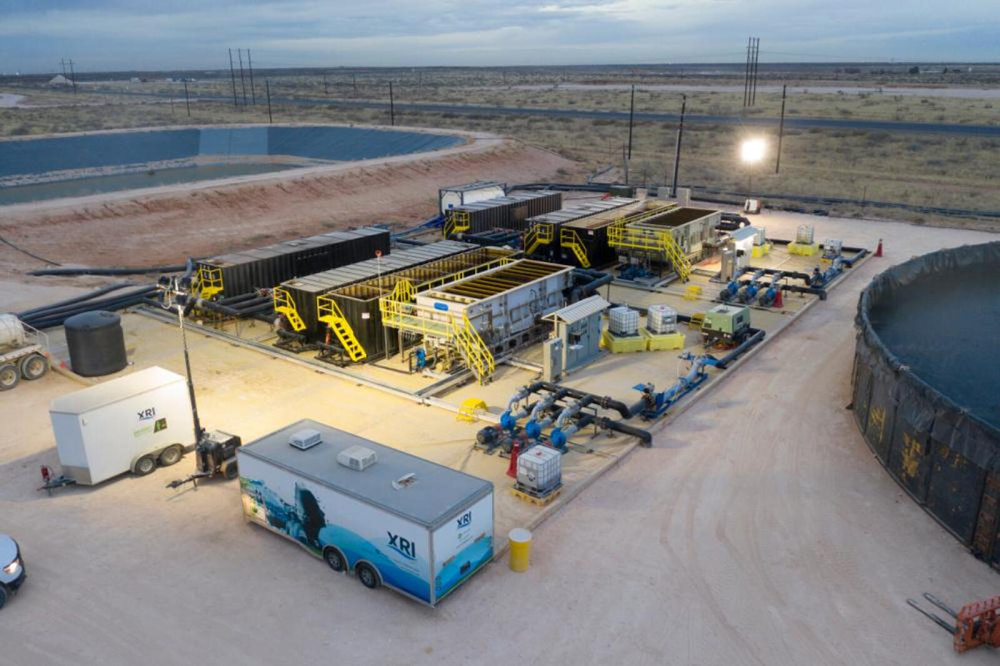February 2023, Vol. 250, No. 2
Projects
US Regulator Approves 135-Mile ET Louisiana Pipeline
Denmark’s Orsted Signs Deal for Norwegian Gas via Baltic Pipe
Orsted AS signed a deal for natural gas from the Norwegian North Sea to be delivered through the newly constructed Baltic Pipe, cushioning the effect of Russian cuts on Danish energy markets, the company said.
Fredericia, Denmark-based Orsted inked the deal with Norway’s Equinor ASA for the period from Jan. 1, 2023, to April 1, 2024, spanning the better part of two winters as Europe seeks to replace all Russian gas supplies with alternative sources.
The agreement calls for total gas deliveries of about 8 TWh during the 15-month period which corresponds to roughly a quarter of the expected total Danish gas consumption.
Soren Thygesen Blad, Orsted’s head of Gas Portfolio Management said the Equinor contract will ensures a stable supply of Norwegian gas as the Tyra field in the Danish sector of the North Sea isn’t supplying gas to the country.
“With this agreement, we’ll have more than enough gas to meet the gas demand of our customers for the coming and next winter, enabling us to stock up our Danish gas storage facilities over the summer,” he said.
France’s TotalEnergies is modernizing its Tyra infrastructure after 40 years of production to optimize efficiency and reduce emissions and flaring.
Denmark is more insulated from the impact of Russia’s gas cutoff than some other Western European countries due to its longtime expansion of renewable energy infrastructure. The birthplace of modern wind energy systems, nearly half of Denmark’s electricity production is powered by wind. It has also responded to the loss of Russian gas supplies by reducing government energy consumption and urging the public to follow suit.
“With this agreement and the production from the South Arne field and from biogas, Orsted has more than covered the consumption of its own customers, which are business customers in Denmark and Sweden,” Orsted said in its announcement of the Equinor deal.
Energy Transfer’s Gulf Run Pipeline Now in Service
Dallas-based Energy Transfer received FERC approval to place the Gulf Run pipeline in service delivering domestically produced natural gas from key U.S. producing regions to meet the rapidly growing demand along the Gulf Coast and international markets.
The newly constructed 135-mile, 42-inch natural gas pipeline in Louisiana has a capacity of 1.65 Bcf/d, with potential growth opportunities.
The pipeline consists of two zones. Zone 1 connects the Carthage Hub to the Perryville markets and Zone 2 extends south and connects to Golden Pass Pipeline and to Energy Transfer’s Trunkline system. The Zone 1 segment has bi-directional flow capabilities, providing the ability to deliver significant volumes to Perryville as well as to the Golden Pass and Trunkline systems.
Gulf Run receives natural gas from Energy Transfer’s extensive intrastate and interstate pipeline network, including production directly from the Haynesville Shale. Volumes originating from all the major natural gas basins in the U.S. have access to the pipeline, including the Permian Basin, the Barnett Shale, the Marcellus and Utica shales, East Texas, the Arkoma and the Anadarko basins.
Energy Transfer owns and operates approximately 120,000 miles of pipeline and related infrastructure across 41 states transporting natural gas, crude oil, natural gas liquids and refined products. Energy Transfer operates more than 8,800 miles of pipeline in Louisiana.
US Regulator Approves 135-Mile ET Louisiana Pipeline
Energy Transfer gained approval to start operations on a natural gas pipeline that will deliver fuel to the U.S. Gulf Coast at a time of supercharged demand overseas.
The 135-mile pipeline Gulf Run pipeline, with a capacity of 1.65 Bcf/d, transports gas from the company’s other Energy Transfer pipelines that link to basins in Texas, Louisiana and Arkansas, running from Westdale to Starks, Louisiana.
Natural gas projects are expected to be move ahead in coming years as production rises and shippers secure new customers in Europe, which is trying to wean itself off Russian energy, and in Asia, where many countries are boosting imports of LNG.
Argentina Nets $689 Million Financing for Vaca Muerta Pipeline
Argentina gained $689 million in financial backing from the Brazilian state development bank BNDES for the second stage of a crucial natural gas pipeline in the huge Vaca Muerta shale region, Energy Secretary Flavia Royon said.
The pipeline, which will provide a major boost to the nation’s gas capacity, will help Argentina " achieve energy self-sufficiency, deepen regional exports and develop LNG projects," Royon told business leaders in the capital Buenos Aires.
The first stage of the gas pipeline, which will link Vaca Muerta in the Patagonian province of Neuquen near Buenos Aires, should be completed in June 2023.
Royon added that the country was also in advanced talks for a $540 million loan from CAF Latin American development bank to support the development of the project.
Vaca Muerta, the world's second-largest shale gas reserve and fourth largest for shale oil, is key to Argentina reversing a multi-billion dollar energy trade deficit, with the government targeting eventual exports of LNG.
XRI art
XRI Building of 230-Mile Water Pipeline System in Permian Basin
XRI Holdings kicked off construction of its Evolution Pipeline system, the company said.
The large-scale, multi-producer water recycling and produced water infrastructure network will connect XRI’s existing pipeline infrastructure system in Midland County to its infrastructure footprint in the Texas counties of Reagan and Upton counties.
“The project is a win-win-win for the industry, community, and environment,” Matthew Gabriel, XRI CEO, said. “The Evolution Pipeline mitigates over pressurization risks caused by injection into salt water disposal wells, reduces the use of groundwater, particularly potable water sources, and lowers our customers’ costs.”
When completed, the Evolution system will comprise 230 miles of pipeline infrastructure with recycling facilities and produced water disposal wells covering much of the Midland Basin.
The Evolution Pipeline system adds water recycling in areas of high seismicity, including the Gardendale Seismic Response Area, with the capability to transport produced water up to 50 miles away from major population centers to XRI facilities.
The system is designed to recycle more than 500,000 barrels of produced water per day from producers in Midland, Glasscock, Reagan and Upton counties.
The Evolution system is supported by long-term contractual commitments with several industry-leading operators, including Chevron, XTO Energy and Pioneer Natural Resources, and will be fully operational in the first quarter of 2023.
ONEOK Seeks FERC Approval for 155-Mile Permian-Mexico Connector
Saguaro Connector Pipeline, a division of ONEOK Inc., submitted an application to the U.S. Federal Energy Regulatory Commission (FERC) to construct infrastructure that would transport more Permian Basin natural gas to Mexico.
Saguaro Connector Pipeline filed for a presidential permit application with FERC to construct and operate facilities for the exportation of natural gas at a new international border-crossing at the U.S. and Mexico border in Hudspeth County, Texas.
The proposed border facilities would connect upstream with a potential intrastate natural gas pipeline, the Saguaro Connector Pipeline, which would be designed to transport natural gas from ONEOK’s existing WesTex intrastate natural gas pipeline system in the Permian Basin in West Texas to Mexico.
Additionally, the proposed border facilities would connect at the International Boundary with a new pipeline under development in Mexico for delivery to an export facility on the West Coast of Mexico.
The potential Saguaro Connector Pipeline would consist of 155 miles of 48-inch natural gas pipeline originating at the Waha Hub in Pecos County, Texas. The ultimate design capacity of the potential pipeline would be approximately 2.8 Bcf/d. Final investment decision on the potential pipeline is expected by mid-2023.
ONEOK is a leading midstream service provider and owner of one of the nation's premier NGL systems, connecting NGL supply in the Rocky Mountain, Mid-Continent and Permian regions with key market centers and an extensive network of natural gas gathering, processing, storage and transportation assets.
Tallgrass Acquiring Ruby Pipeline, 1.5 Bcf/d of Gas Capacity
Tallgrass will buy the bankrupt Ruby Pipeline, a 683-mile, 42-inch natural gas pipeline built in partnership by Kinder Morgan and Pembina that runs from Wyoming to Oregon.
Tallgrass agreed to purchase the pipeline for an undisclosed amount, outbidding Kinder Morgan in a court-ordered auction held on Dec. 13.
According to Tallgrass, the acquisition of Ruby provides access to established markets, an additional 1.5 Bcf/d of natural gas capacity to the company’s portfolio and immediate and strong cash flow to the company.
The investment will provide Tallgrass a platform to enhance natural gas service to West Coast markets. It also provides an opportunity for Tallgrass to use the infrastructure network to offer decarbonized energy solutions, such as natural gas distribution in the U.S.
In January 2009, Ruby Pipeline LLC submitted a request to the Federal Energy Regulatory Commission (FERC) to build and run the Ruby Pipeline Project. The application was authorized by the FERC in April 2010. The pipeline was put into service on July 28, 2011, following the start of construction on July 31, 2010.
“Ruby’s capabilities maintain our nation’s energy security and provide long-term opportunities in the transportation of the molecules that will be required in the energy transition,” Matt Sheehy, president and CEO of Tallgrass, said. “In addition to gaining new teammates, this acquisition further advances our track record of optimizing existing infrastructure to lead energy solutions.”
Earlier this year, Ruby Pipeline LLC filed for bankruptcy under Chapter 11 in order to reorganize more than $475 million in long-term debt. In November, Pembina agreed to pay $102 million to resolve its responsibilities for the Ruby Pipeline in an attempt to emerge from the bankruptcy.
Ruby reached an agreement with its creditors during the summer to sell its natural gas pipeline with plans to fully come out the red in early 2023.
Kazakhstan to Bump Up Oil to Germany Via Druzhba Pipeline
Kazakhstan’s national transporter, KaztTransOil, asked Transneft to ship an additional 300,000 tonnes of oil during the first quarter of next year – a request requires the approval of Russia’s energy ministry.
According to Reuters, the news agency RIA Novosti news agency reported the request was for 1.2 million tonnes of capacity on the Druzhba pipeline for 2023 as part of an effort to increase oil shipments to Germany.
The European Union pledged to stop buying Russian oil via maritime routes from Dec. 5. as part of wider sanctions over Ukraine. The Druzhba pipeline is exempt from this mandate, but Germany's refineries in Leuna and Schwedt, connected to the pipeline, are no longer ordering Russian crude for next year, according to Germany’s economy ministry.
The ministry expressed optimism that Kazakh oil, which would come through the Druzhba pipeline via Poland, can supplement il shipments for Schwedt.







Comments